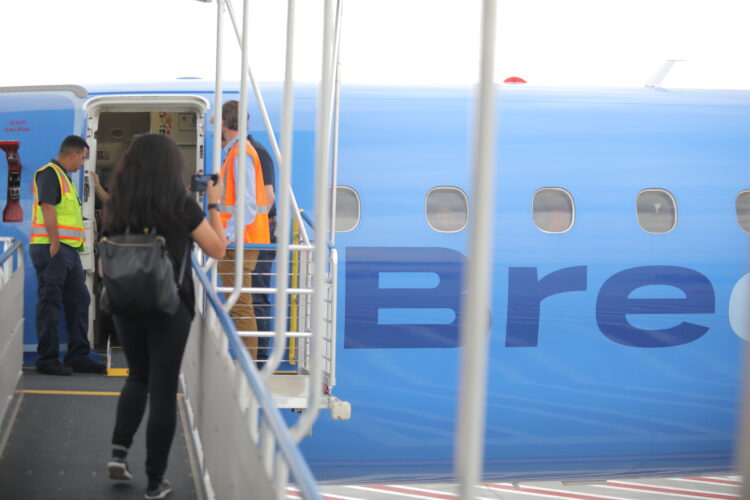[ad_1]
“Listen, I’ve had sex. I’ve been in love. I’ve traveled the world. But I’ve never experienced anything—anything—like that.”
Those were the words that greeted me as I sat in a nondescript central London pub called King Charles I, fresh off a six hour flight from DC and preparing to meet up with my best friend Connor who had arrived in London from Minneapolis the day before. A few hours before, Connor, a fellow diehard Arsenal supporter, had managed to finagle his way into Emirates Stadium to watch his beloved Gunners take on Nottingham Forest in a Premier League matchup. Arsenal stole the show with a five-nil win, but I’m pretty sure he would have had the same reaction even if they’d come away with a loss.
We were there to see football—AKA soccer—racking up as many matches as possible along with a few stadium tours and a visit to the National Football Museum in Manchester. It was a pilgrimage of sorts, two American fans realizing their dream of cheering alongside fellow fans as they watched star athletes they’ve only ever witnessed on television darting around the pitch in real time. And while each of us had been to plenty of hometown sporting events before—sat courtside at NBA games, fought nosebleeds in below-freezing temperatures at NFL and college football showdowns, and even shared a pair of Mets season tickets during the late-great Shea Stadium’s final year in action—transporting oneself across the ocean to one of the holy temples of the Beautiful Game, in all its eardrum-popping glory, was an entirely new kind of magic.

Throughout the next eight days, we found ourselves reliving the splendor at stadiums across the country. We sat in the press booth at Meadow Park, while Arsenal’s star-studded women’s side toppled West Ham in a three-one defeat, wincing as beloved team captain Kim Little hobbled off the field with a soon-to-be-confirmed ACL injury. We raced from Manchester to Liverpool late one evening, braving the frigid weather to snag two tickets in an illicit handshake deal and file into Anfield’s Road Stand for a Champions League match, our seats smashed right up against visiting Napoli’s vociferous away section.
Later, we got the royal treatment in a hospitality box in Southampton, sipping Champagne while the embattled home side gave up four goals to skyrocketing Newcastle. We toured Emirates in North London, Stamford Bridge in Chelsea, and Wembley, home to England’s decorated national team, and in between, joined countless others clad in Arsenal’s signature red and white at area pubs to root the lads (and lasses) on over pints of cask ale.
It was early November 2022, and the world was emerging from its pandemic-induced hibernation in search of the kind of unadulterated joy only globetrotting can bring. For sports fans, especially those following international teams, the promise of seeing your heroes jump off the screen and into your immediate surroundings provided even more incentive to finally buy that long-awaited plane ticket. And with so many mass spectator events returning to their new normal of restriction-eased programming—Qatar’s FIFA World Cup 2022, the 2022 Olympic Winter Games in Beijing, Hanoi’s 31st Southeast Asian Games, the 2022 Kentucky Derby in the States, the Men’s 16th Rugby League World Cup in England, the multi-city 2022 Formula One World Championship, the FIFA 2023 Women’s World Cup in Australia and New Zealand, to name just a few—there’s never been a more exciting time to travel for sports.

According to the United Nations World Tourism Organization (UNWTO), a specialized agency formed to promote “responsible, sustainable and universally accessible tourism,” sports represents one of the industry’s fastest growing sectors. At the organization’s 2021 World Sports Tourism Congress in Lloret de Mar in Catalonia, Anna Caula (the region’s Secretary General for Sport and Physical Activity) solidified the relationship between tourism and sports—one the UNWTO calls “interrelated and complementary.” She stated, “Tourism is a great tool to open up our territory to the world, and sport must also be at the centre [sic] of creating this ecosystem. We must put the focus on sport as it moves millions of people at different levels, both nationally and internationally.”
The numbers speak for themselves. In an October 2022 study entitled Global Sports Tourism Industry, the France-based, AI-powered market research platform ReportLinker forecasted that the world’s sports tourism market, valued at $769.7 billion USD in 2020, is set to reach $1.7 trillion USD over the next five years. For you econ nerds, that’s a compound annual growth rate of 11.7% between 2020 and 2027. Soccer-focused tourism alone, ReportLinker predicted, will swell to $671.2 billion USD over the same time period, enjoying an unprecedented 13.6% CAGR.

And it’s not just the big boys—emphasis on the word boys—benefiting from this uptick of in-person attendance. Previously under-represented corners of the playing field, most specifically women’s professional sports, are also recording major gains. Take the UEFA Women’s EURO 2022, which drew an aggregate attendance of 574,875 to various pitches throughout host country England, more than double 2017’s total. July 31’s final, a high-stakes battle between England and Germany at Wembley, went down in front of 87,192 ticket-holders—the largest audience in the history of European national team tournament games, men’s or women’s. As it turns out, a rising tide does indeed lift all ships—especially those who’ve long awaited their righteous due.

The facts are the facts, sure, but no amount of calculations can answer one key question when it comes to traveling for sports: Why? Why are everyday citizens suddenly willing to shell out hundreds, even thousands, of their hard-earned cash to experience their favorite teams in the flesh? Especially when they can most likely access better views of the same game streaming directly into their living rooms in pristine 4D? The answer, in short, is the vibes.
“My mom, 73, is a HUGE tennis fan,” says Nashville-based lifestyle journalist and avid tennis enthusiast Kristin Luna. “She’s the type who watches every tournament on TV, men’s and women’s, from start to finish no matter how minor. But there’s nothing that compares to the energy of being inside a stadium, especially during a heated match or rivalry. The shared experience of watching a favorite athlete or team play with fellow fans makes the hassles of traveling right now—the crowds, the flight cancellations, the apps requiring you to show your vax card that inevitably fail in the moment—worth it.”
Years of pandemic-fueled lockdowns has only made Luna and her mom more dedicated to attending games in-person. “We did virtually no traveling for the better part of two years—a lot of the major tournaments were canceled, and those that eventually were rescheduled, were done so with empty stadiums,” she continues. “When you take into account the relatively short shelf life of professional or college athletes, two years can be a large percentage of an athlete’s career.”

For sports fans, it’s now or never. “We’ve been so isolated for so long that we crave community and entertainment, and nothing satisfies those cravings more than sport,” says Lavender Baj, a freelance journalist and lifelong Liverpool supporter based in Sydney, Australia. “Those major sporting events where people from all over the world come together to share a common love are just really special. Whenever I travel for sport, I end up bumping into another Aussie, and there’s just this sense of community that you feel, despite the fact that you don’t know each other from a bar of soap.”
Tourism on this scale impacts much more than the teams, stadiums, and onsite vendors, of course. Those traveling for sporting events are likely to spend their money outside of the playing grounds, whether it’s at local shops, hotels, and restaurants or cultural and sightseeing opportunities that work to round out their trips. That’s the hope, at least, for Chris Allison, VP in charge of North American tourism for Tourism Australia, as his country prepares to co-host the next FIFA Women’s World Cup this coming summer.

“With Australia’s reopening to the world in February, after two years of international travel being on hold, the tournament is a timely reminder of how sport and tourism can bring people together and reconnect them with people and places,” says Allison. “And with five Australian cities hosting parts of the tournament—Sydney, Melbourne, Perth, Adelaide, and Brisbane—the World Cup is an opportunity to shine the spotlight on Australia and remind people of all the wonderful attributes that make our country a great place to visit.”
Traveling for sport is also giving a boost to a previously niche corner of the tourism industry: sports travel agencies. Companies that specialize in designing upmarket sporting event packages geared toward families, corporate groups, club teams, and even solo travelers willing to throw down are popping up all around the world, from the States to the UK, Australia, South Africa, and India. Wherever sports fans live, a tailored travel agency is only a few clicks away.

With more than 30 years in the business, Roadtrips president Dave Guenther is happily riding the current wave. “We’re having a record year and bookings for 2023 and 2024 are strong,” he says, having just returned from hosting groups at the FIFA World Cup in Qatar. “Sporting events, especially the big international ones we specialize in, are definitely bucket-list experiences for many folks. I also think, as more people have become familiar with Roadtrips and the chance to customize and personalize their experience around these events, it’s added to the accessibility and ability to attend.”
And it’s not just rabid fans getting into the games these days. As Tourism Australia’s Allison alluded, there’s much more to sports travel than simply attending a game or two. “There’s a tremendous electricity and buzz surrounding a sporting event, from cultural events to concerts to just the gathering of so many enthusiasts in one place,” adds Guenther. “I’ve had many clients tell me that they don’t normally watch sports on television, but that being there live was one of the most thrilling experiences of their lives.”
Take it from Baj, who made her own bucket list journey to England to a few Premier League fixtures earlier this year. “Even if you’re not a massive sports fan, there’s no way you can go to a stadium as iconic as [Manchester United’s] Old Trafford or [Liverpool’s] Anfield and not be overwhelmed with emotion,” she reflects. “Those moments are some of the greatest moments in my life, and I want everyone to experience them at least once.”

Back in the UK, Connor and I caught an Uber from our Airbnb in Whitechapel up to North London for an 11 am self-guided tour of Emirates Stadium, home to our mighty Arsenal. As our driver, Terry, navigated north toward Shoreditch, he turned to survey us in the backseat.
“You’re going up to the Emirates, yeah?” he asked casually.
“Yeah,” I said. “Are you an Arsenal supporter?”
“Born and raised, yeah, season ticket-holder. Me wife’s a steward, and me daughter, too. Me other daughter, she’s a schoolteacher, but she loves the game,” he said, nodding.
For the next 30 minutes, Terry told us all about growing up in Arsenal’s backyard of Islington, back when they played at old Highbury, an Art Deco beauty that held court as the “Home of Football” from 1913 until 2006. He pointed out where some of the former greats still lived, down private cobblestone streets lined with manicured English gardens. He told us how he had picked up a teenage boy some weeks back, only to find out he played for Arsenal’s prestigious youth academy and that his older brother had a few caps with the main squad under his belt.
Pulling onto Highbury Road, Terry gestured toward a friendly looking cafe that employed a clever pay it forward scheme, working with patrons to provide meals for local community members in need. He also showed us his favorite game day pubs, homey corner affairs he said were guarded by tough security officers during particularly heated rivalries. “Anybody from the other side try to come in, they get sorted quick,” he quipped.

Just before we pulled into the roundabout leading to the hulking, ultra-modern stadium, Terry had one last question for us: “So, you’s got your Arsenal tattoos yet?”
Connor, not a tattoo guy, shook his head definitively. “Haven’t yet, but I’d like to,” I said. “You?”
“Just a small one,” he said, winking and rolling up his left pant leg to reveal a massive Arsenal crest in full color, the bright red shield and golden cannon stretching half-way around his calf.
Traveling for sports isn’t just about the games, it’s about every second of the experience. There’s hearing the players shout directives at each other straight from the sidelines. There’s shouting along to the cheeky supporters’ songs in a sea of undulating bodies. There’s downing savory pies and pints of cider between halves, bartering with street vendors for the last throwback scarf, and snapping selfies beneath the lights, the pitch’s dewy green filling in the background. And then there’s meeting Terry, the kindly driver with whom you share a language, a passion, perhaps even a culture only other fans can truly comprehend.
Want more Thrillist? Follow us on Instagram, Twitter, Pinterest, YouTube, TikTok, and Snapchat!
[ad_2]
Source link


